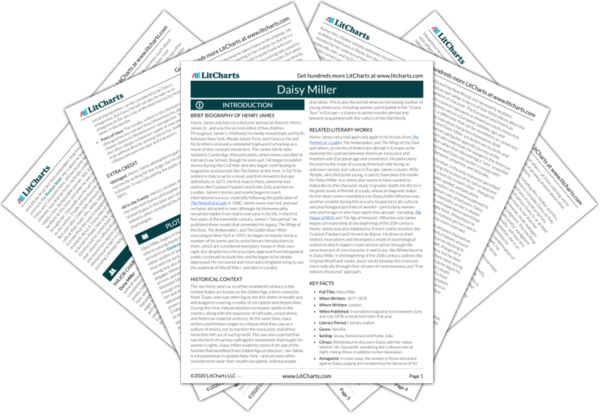Many of the novels of Henry James—an American expatriate himself—are fascinated with the Old World and the New World, not necessarily as places themselves but rather in terms of how these places affect the development of character. The European and American continents come to represent an American youth, innocence, and spontaneity versus a European subtlety, age, and complexity—a difference that can be revealed in, or conversely challenged by, individual characters themselves. Both Winterbourne and Daisy Miller are Americans by birth, and both find themselves taking the opposite journey of the European explorers who undertook the voyage to the Americas centuries before. But rather than discovering a “new,” unspoiled paradise, Winterbourne and Daisy encounter a society with strict rules for social behavior, propriety, and attitudes.
Randolph, Daisy’s little brother, is the only character permitted (because of his youth) to sing the praises of his native land and to constantly compare the countries to each other—though he tends to be portrayed as a wild, spoiled, and peculiarly American child as well. Older visitors are instead supposed to implicitly understand the European rules of behavior. Daisy seems to epitomize an American mentality, as she is always eager to grasp new opportunities and experience new things without regard for what others might think. Winterbourne remarks several times that she is the chattiest girl he’s met in years; Europeans, in his view, tend to be more reserved.
Still, many other characters are quick to distance themselves from Daisy, fearing that she will make the Europeans around them look down on the vulgar American tourists flocking to their cities. Winterbourne is American as well, though he is largely assimilated to life and culture in Geneva, but he does take a liking to Daisy: he is the character who feels most strung between the two cultures and ways of life, even as he aligns his own lifestyle with the European worldview. Daisy’s death ultimately serves as a warning about the danger of a total frankness and naiveté in the American mode, but European judgmental attitudes and unwillingness to see the charm in American “innocence” do not escape the author’s critique either.
European and American Character ThemeTracker

European and American Character Quotes in Daisy Miller
“But I really think that you had better not meddle with little American girls that are uncultivated, as you call them. You have lived too long out of the country. You will be sure to make some great mistake. You are too innocent.”
Winterbourne meditated a moment. “They are very ignorant—very innocent only. Depend upon it they are not bad.”
He remembered that a cynical compatriot had once told him that American women—the pretty ones, and this gave largeness to the axiom—were at once the most exacting in the world and the least endowed with a sense of indebtedness.
“Well,” said Winterbourne, “when you deal with natives you must go by the custom of the place. Flirting is a purely American custom; it doesn’t exist here.”
He was angry at finding himself reduced to chopping logic about this young lady; he was vexed at his want of instinctive certitude as to how far her eccentricities were generic, national, and how far they were personal.











